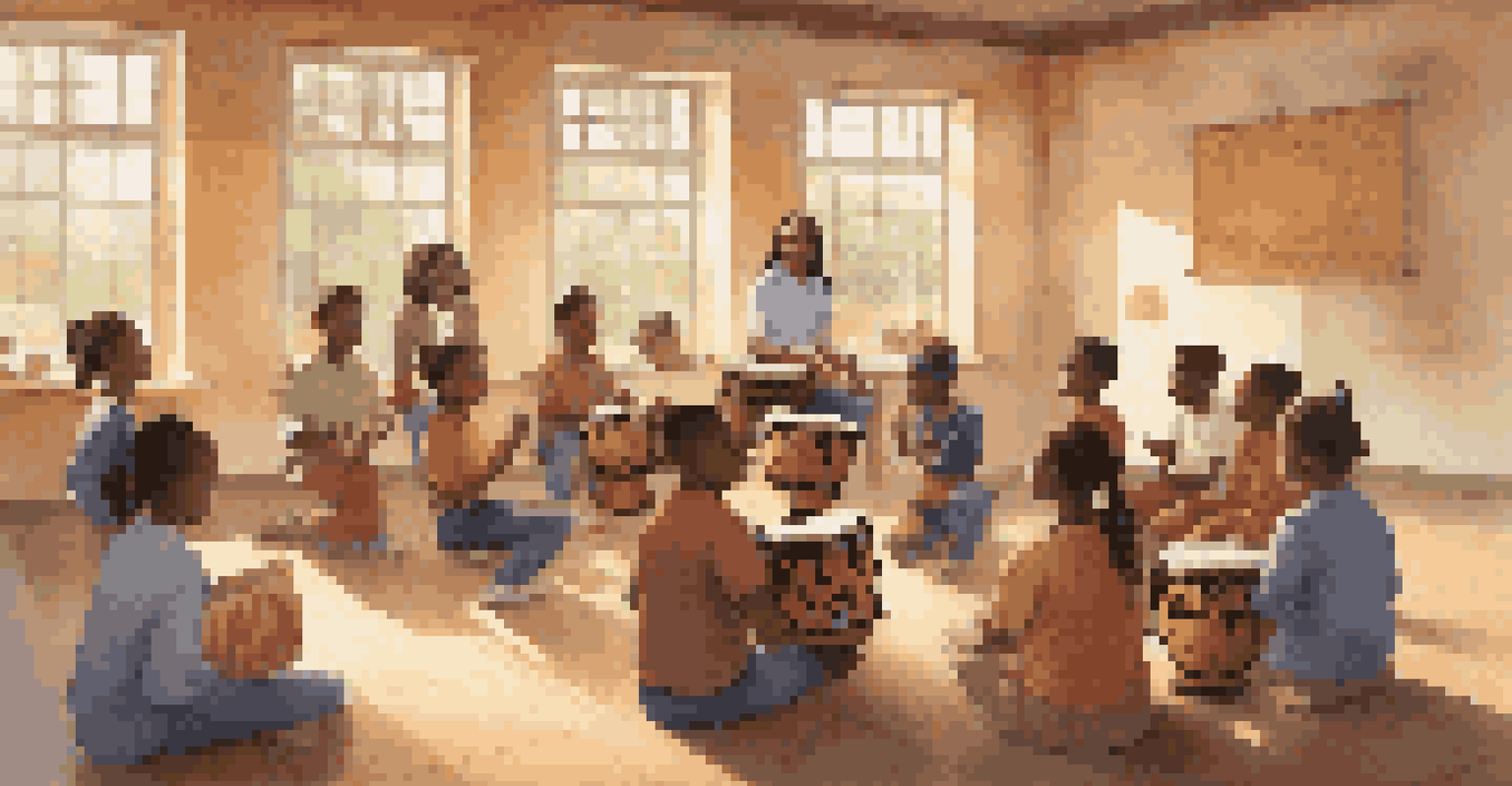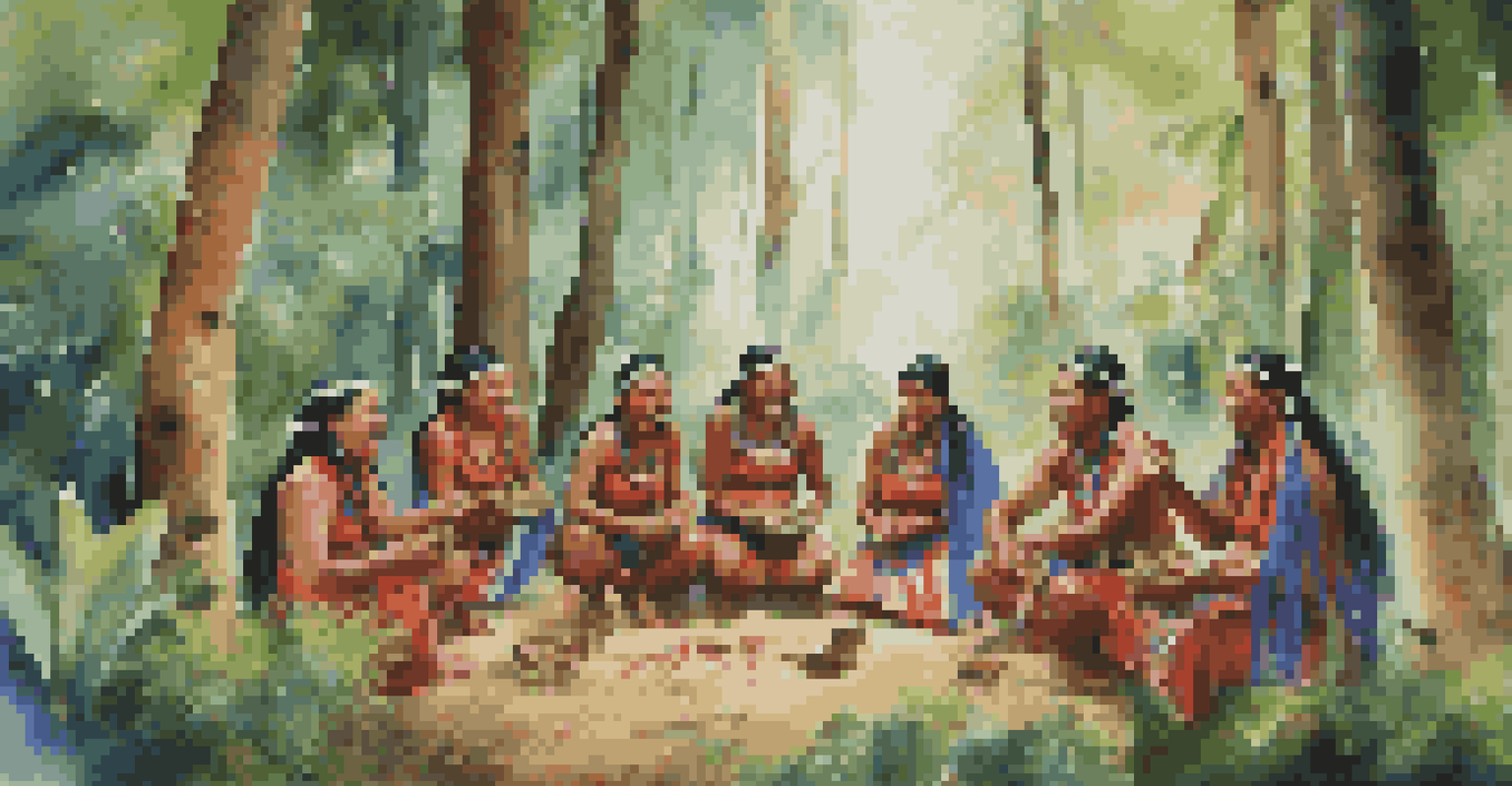The Role of Music in Cultural Education and Awareness

Music as a Universal Language in Cultural Education
Music transcends linguistic barriers, allowing people from diverse backgrounds to connect. It serves as a universal language that expresses emotions and stories that resonate across cultures. For instance, a simple melody can evoke feelings of joy or sorrow, regardless of the listener's native tongue, creating a shared experience.
Music is the universal language of mankind.
Through music, individuals can gain insights into different cultural practices and histories. Traditional songs often carry historical narratives, reflecting the values and struggles of a community. This makes music an effective tool for cultural education, enabling listeners to appreciate the richness of various heritages.
Moreover, music fosters empathy and understanding among people. When we listen to songs from different cultures, we gain a glimpse into how others live and what they value. This shared understanding is crucial for building a more inclusive society, where diverse voices are celebrated.
The Role of Music in Promoting Cultural Awareness
Music plays a pivotal role in raising cultural awareness, particularly through festivals and live performances. Events that showcase music from various cultures allow audiences to experience different traditions firsthand. For example, a world music festival not only entertains but also educates attendees about the unique sounds and rhythms of each culture.

Additionally, music can serve as an educational tool in classrooms, giving students a tangible way to explore and appreciate cultural differences. By incorporating songs from around the world into lessons, educators can engage students in discussions about cultural significance and historical context. This interactive approach makes learning about cultures more dynamic and memorable.
Music Connects Diverse Cultures
Music transcends language barriers, fostering emotional connections and shared experiences among people from different backgrounds.
As listeners engage with music from different backgrounds, they develop a deeper appreciation for diversity. This heightened awareness can inspire people to explore other aspects of a culture, such as art, dance, and cuisine. Ultimately, music acts as a gateway to broader cultural education.
Music's Role in Preserving Cultural Heritage
Many cultures rely on music to preserve their heritage and pass down traditions through generations. Traditional music often encapsulates the identity and values of a community, serving as a reminder of its history. By keeping these musical traditions alive, communities ensure that their unique stories and experiences are not forgotten.
Where words leave off, music begins.
For example, indigenous tribes often use music in rituals and ceremonies, linking the past with the present. These musical expressions can provide insights into their worldview, beliefs, and connection to the land. As younger generations learn these songs, they reinforce their cultural identity and heritage.
Furthermore, music preservation efforts, such as archiving recordings and supporting local artists, are crucial for maintaining cultural diversity. These initiatives help combat the homogenization of culture in a globalized world, ensuring that unique musical styles continue to thrive and inspire future generations.
Incorporating Music into Cultural Education Programs
Integrating music into cultural education programs can enhance learning experiences for students of all ages. Educators can use music as a vibrant medium to teach about different cultures, making lessons more engaging and relatable. For instance, students might explore African drumming or Latin dance as a way to understand cultural rhythms and traditions.
Music workshops can also be an excellent way to involve the community in cultural education. By inviting local musicians to share their knowledge and skills, participants gain hands-on experience with diverse musical forms. This not only enriches the learning environment but also builds connections between cultures.
Music Preserves Cultural Heritage
Traditional music serves as a vital link to cultural identity, ensuring that communities pass down their unique stories and values through generations.
Moreover, online platforms have made it easier to access music from around the world, providing vast resources for educators. By incorporating diverse musical selections into their curricula, teachers can inspire curiosity and foster a broader understanding of global cultures.
The Impact of Music on Cultural Identity
Music heavily influences cultural identity, helping individuals connect with their roots and communities. For many, songs are tied to personal experiences and collective memories, serving as a soundtrack to their lives. This connection fosters a sense of belonging and pride in one's cultural heritage.
Additionally, music can evolve over time, reflecting changes in society and identity. Contemporary artists often blend traditional elements with modern styles, creating new genres that resonate with younger audiences. This fusion not only keeps cultural music alive but also allows for the exploration of identity in a globalized world.
As people navigate their cultural identities, music provides a platform for expression and exploration. Whether through traditional folk songs or modern hip-hop, individuals can articulate their experiences and perspectives, contributing to a rich tapestry of cultural dialogue.
Music as a Tool for Social Change and Advocacy
Throughout history, music has been a powerful tool for social change and advocacy, often addressing cultural issues and injustices. Artists use their platforms to raise awareness about social issues, inspiring listeners to engage and take action. Songs that speak to the struggles of marginalized communities can galvanize support for movements and create a sense of solidarity.
For instance, protest songs have played significant roles in various social movements, from civil rights to environmental activism. These powerful anthems resonate with individuals, motivating them to stand up for their beliefs. Music has the ability to unite people and amplify their voices in ways that words alone might not achieve.
Music as a Catalyst for Change
Throughout history, music has been a powerful tool for social change, uniting people to advocate for justice and cultural awareness.
Moreover, collaborations between artists from different backgrounds can foster cross-cultural dialogue and understanding. When musicians come together to address common issues, they demonstrate the power of unity in diversity. This collaborative spirit can inspire collective action and build bridges between cultures.
Challenges in Music and Cultural Education
While music plays a vital role in cultural education, there are challenges to its effective integration. One obstacle is the underrepresentation of certain musical traditions in mainstream education. As a result, students may miss out on the rich diversity that exists within global music. It’s essential to actively seek out and include a variety of musical styles in educational settings.
Additionally, access to music education can be limited in some communities, particularly in underfunded schools. Without resources or trained educators, students may not have the opportunity to explore music from different cultures. Addressing these disparities is crucial to ensure that cultural education through music is accessible to all.

Moreover, the commercialization of music can sometimes overshadow its cultural significance. As popular music dominates airwaves, traditional and local music styles may struggle to find a platform. It’s important to recognize and celebrate the value of all musical expressions, ensuring that cultural education remains a priority.